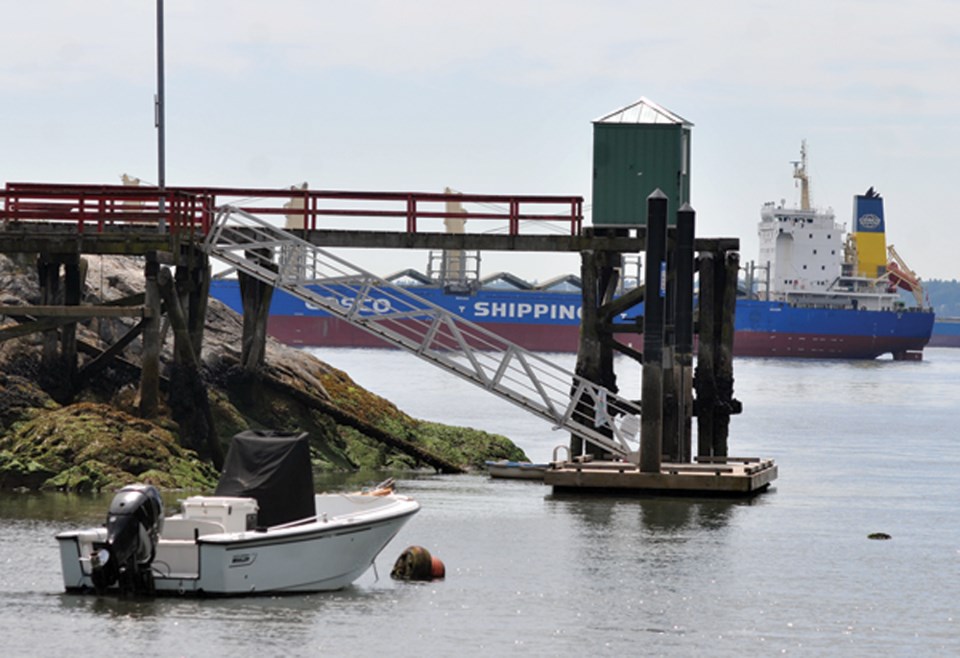Sometimes it’s a constant low throbbing. Other times that throbbing is accompanied by a high-pitched hum.
“It’s like having a garbage truck revving at the bottom of your driveway all day long,” says Dianne Sherwood, who lives on West Vancouver’s Piccadilly South.
Residents who live at the head of Caulfeild Cove say sound from freighters anchored close to shore off West Vancouver is a constant irritation. And they say that noise pollution is getting worse.
“The noise seems to echo here,” said Sherwood. “It’s a very difficult thing to be constantly bombarded by noise.”
The issue of noise from freighters goes back several years, but neighbours say the problem has recently become much more noticeable.
At issue are three anchorages in English Bay near to Lighthouse Park, used by freighters waiting to dock at shipping terminals in the Port of Vancouver.
When Bill Wheeler first moved to Pilot House Road over 30 years ago, “those anchorages weren’t used,” he said. As traffic to the port increased, the anchorages were opened up, but “they weren’t used very often,” he said.
In the past decade, the three anchorages off West Vancouver were switched from seasonal use to year-round use.
Supply chain issues increase anchorage use
Supply chain issues that hit during the pandemic, causing the port to back up, significantly ramped up the issue, say neighbours. That’s meant anchorages off West Vancouver are now in almost constant use, said Wheeler.
He uses noise-cancelling headphones and moved his bedroom to a different part of the house to cut down on sleep disturbance.
“We’ve lived in the neighbourhood 20-odd years, and we’ve never seen anything like this,” said Barb Lunter, whose home is in Olde Caulfeild.
“It’s a constant, irritating hum,” said Lunter. “I know people way up the hill who hear it. There’s kind of an ampitheatre effect.”
Residents say some ships appear to be worse noise polluters than others. Large container ships are among the worst offenders, said residents. “They run big generators,” said Wheeler.
Caulfeild neighbours have regularly written to the port to complain about the noise.
Port contacts ships about noise
When they receive complaints, the port contacts the ship's master, asking them to cut down on noise when possible.
“Some of them do definitely reduce the noise,” said Sherwood.
But many others don’t.
Mostly the message residents have received back is, “If it’s a container ship and it’s a generator, there’s not much we can do,” said Lunter.
In response to questions from the North Shore 撸奶社区, a spokesperson from the Vancouver Fraser Port Authority said there has been an increasing demand for anchorages connected to global supply chain issues.
The port has also received a recent noise complaints, the spokesperson said. “In many instances, our operations team will contact the vessel’s agent to remind the vessel’s master that they are anchored near residential areas.”
Ships are required to minimize noise levels while at anchor, according to the port. “However, if the source of the noise is due to a vessel generator, little can be done as vessel generators are required to power emergency navigation equipment and basic amenities on board for the crew.”
Suggestions not heeded
Wheeler says he thinks the port could do more to minimize the noise Larger freighters could be positioned at anchorages further from shore, he said. Ships that are the subject of noise complaints could also be flagged and moved further offshore during the stops in the port, he suggested.
So far, however, those requests appear not to have been listened to.
Sherwood said she considered meeting with the port on the issue, but has become discouraged that any change will result.
“We knew it was going to be useless,” she said. “They weren’t going to do anything.”
For now, which ships anchor off Caulfeild and how much noise they make appear to be the luck of the draw.
Said Sherwood, “You see one pull in, and you just have your fingers crossed it’s not one of the noisy ones.”


